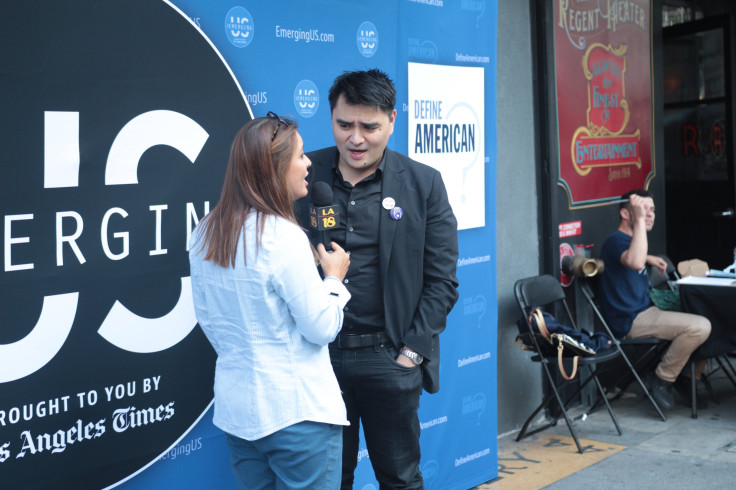
Jose Antonio Vargas is comfortable talking about race and he wants caucasians to get comfortable, too. As a gay undocumented Filipino who majored in African American studies and has a talent for prose and public speaking, he’s outspoken when talking personal politics.
“When you see a person who looks Asian, and has a last name like Castro, Sanchez or Vargas,” he tells the crowd at a pre-screening of “White People,” raising his thick eyebrows and pausing for effect, “it’s called ‘Filipino.’”
“White People,” which comes out today (Wednesday July 22nd), is an outgrowth of Vargas’ interests and existing projects like Define American, which adds a multi-racial dimension to an immigration debate dominated by talk of Mexicans and other Latinos, and Emerging U.S. a sort of multi-ethnic Fusion that will be launched by the L.A. Times in September. Vargas’ first film, “Documented” charted his life as an undocumented immigrant, an accomplished journalist rose to become America’s posterboy for Dreamers. The 90 minute documentary was emotional, confessional and pointant. It taught viewers nuances about immigration law -- something that few people know about.
"White People" is a sharp departure from "Documented" in both subject and tone. With a gentle approach, "White People" discusses white privilege, racism and the relationship between “whiteness” and immigration. At its best, the film shows whites calmly reflecting on race. This is a film that you can take your white grandma or your confederate-flag waving friend to. Even the more “jarring” moments might actually be the most useful for starting conversations in Caucasian homes. For example, Vargas lets whites get treated as a monolithic block, just as Latinos, African Americans wantonly grouped together in discussions on race. Cubans and Chicanos will get this, just like Nigerian immigrants and Mississippians might. Still, he takes time to question the idea of whiteness itself. When did Irish or Italians become white, he asks throughout the film. “White People” is also humorous at times, though depending on the audience the laughs will come in different places.
At its worst moments, White People’ pedagogy becomes didactic. Vargas is not just an observer in the film, but a moral arbitrator. When an Arizona teen complains that she can’t get college scholarships because she’s white, Vargas marshals facts and the movements of his thick eyebrows to tell the audience where the racism is, in the same way canned laughter might point to a subtle joke in a sitcom. Vargas still humanizes his subjects, but not quite as well as the white southern subjects in “Documented,” who are gently juxtaposed. But “Documented” was distributed by CNN, while “White People” was pushed out by MTV. That difference may not explain the editorial choices of the film, but it certainly describes it. I wasn’t the first to say this, so instead of paraphrasing I’ll just quote those who felt the same way.
"’White People’ seems more like a pilot for a reality series than a documentary,” writes Mary McNamara of the L.A. Times .
“Vargas is so keen not to overwhelm his audience that he ends up treating it like it’s dumb: one must go very gently with the white people!” says Slate TV Critic Willa Paskin , in conversation with Aisha Harris, who recommend alternative white people movies.
Yet the most interesting conversation about white people might not have happened yet. It might be worth watching just to be in the loop during what Vargas is hoping will be a massive social media discussion. This week, Vargas ( @joseiswriting ) and Look Different (MTV’s race bias project) are likely to spark a huge social media conversation on race around the hashtag #whitepeople . Vargas never sought to create the magnum opus of race relations, but to spark a conversation. With the hashtag white people already trending on twitter as this post goes up, he may have already won.
#WhitePeople is now No. 1 on Twitter. Thanks for watching and tweeting, folks. pic.twitter.com/X3EXvXBZvk
— Jose Antonio Vargas (@joseiswriting) July 23, 2015You can watch the film on YouTube, below.
© 2025 Latin Times. All rights reserved. Do not reproduce without permission.



